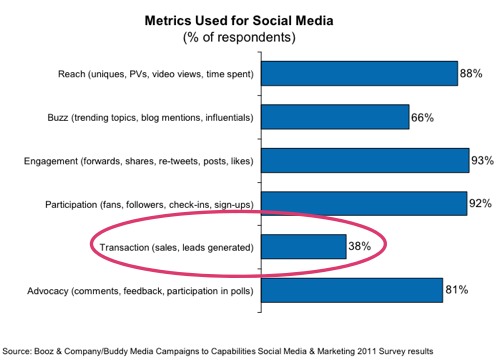Yesterday I was reading an article on ClickZ about the disconnect between social media and sales. One thing that stuck out was a graphic from a Booz & Company study titled, Campaigns to Capabilities Social Media & Marketing 2011 [PDF]. The graphic in the ClickZ article is the same one I show here, which indicates that only 38% of marketers are tracking sales and leads as part of their social media measurement. How can it be that more than 60% of marketers have no idea whether or not their social media campaigns result in some kind of transaction?

Most Social Media Tracking is Valueless
The soft stuff is largely what’s being tracked in social media. Almost everyone is tracking re-tweets, shares, likes, and the other forms of nearly valueless engagement. I say this stuff is valueless because it doesn’t require any effort on the part of the user and it doesn’t translate into any actionable outcome. We all have that like-happy friend who likes absolutely everything we post. Many re-tweets are a result of bribery for contests and other offers.
Counting fans and followers is equally suspect. In one campaign I have stats for, the number of fans to a Facebook page were increased by over 2000 simply because one lucky person would receive a Starbucks gift card.
While some social media engagement may spill over to a new person clicking through to your site or engaging with your brand, there’s apparently no connection to life time value. Instead of looking at how many social media engagements it takes for someone to become a customer or client, marketers are looking at total volume of actions and assuming things must be working because more is better.
Measuring Transactions Shows What’s Working
Mentions by blogs and other influentials are also being heavily tracked, but again, there’s no proof that any of this actually results in either acquiring new customers or retaining existing customers. As one of those bloggers who also happens to be obsessed with affiliate marketing, I generally use an affiliate link wherever possible, in part because I like getting paid, but more importantly because it helps me understand whether the things I write are useful or not. Getting data about how many of the clicks I deliver result in a sale tells me that I effectively communicated a solution to the reader’s problem.
If you downloaded the PDF of the Booz & Company report, you will also see the that less than half of the marketers surveyed view generation of sales and leads as a benefit of social media. And yet, these same marketers plan to spend even more money on social media this year. Sales and lead generation are a benefit of social media, but you need to be willing to measure the results to recognize the benefit.
Tracking Social Media is No Different Than Affiliate Tracking
In a previous post, Peter outlined how social media engagement can be tracked to reward affiliates for actions beyond generating a sale. This may have the added benefit of being able to identify how many people who engage with social media later become customers.
I propose that it’s time to flip the tracking around. If your company is already doing affiliate tracking, why not treat your internal social media efforts as an affiliate? Setup the social media team as an affiliate in your affiliate tracking software, provide them with custom campaigns for various social media initiatives and measure the success of their efforts just like you would an affiliate. As Peter demonstrated, you can assign value to a like or a tweet, but you can also find out how much of that social media activity results in a more committed engagement.
I’m not suggesting your social media team compete with affiliates, simply that the tracking tools you have in place for tracking affiliates are ideal for identifying which social media efforts result in leads and sales for the company. Once you’ve successfully identified what is working, you have a more justifiable position for increasing your social media efforts. Or maybe that’s the problem – as soon as upper management realizes social media isn’t generating the business, the budget will get slashed.
Are you tracking sales and leads that result from social media engagement? Why or why not?
Author
Becky is the Senior Content Marketing Manager at TUNE. Before TUNE, she led a variety of marketing and communications projects at San Francisco startups. Becky received her bachelor's degree in English from Wake Forest University. After living nearly a decade in San Francisco and Seattle, she has returned to her home of Charleston, SC, where you can find her enjoying the sun and salt water with her family.




Leave a Reply
You must be logged in to post a comment.